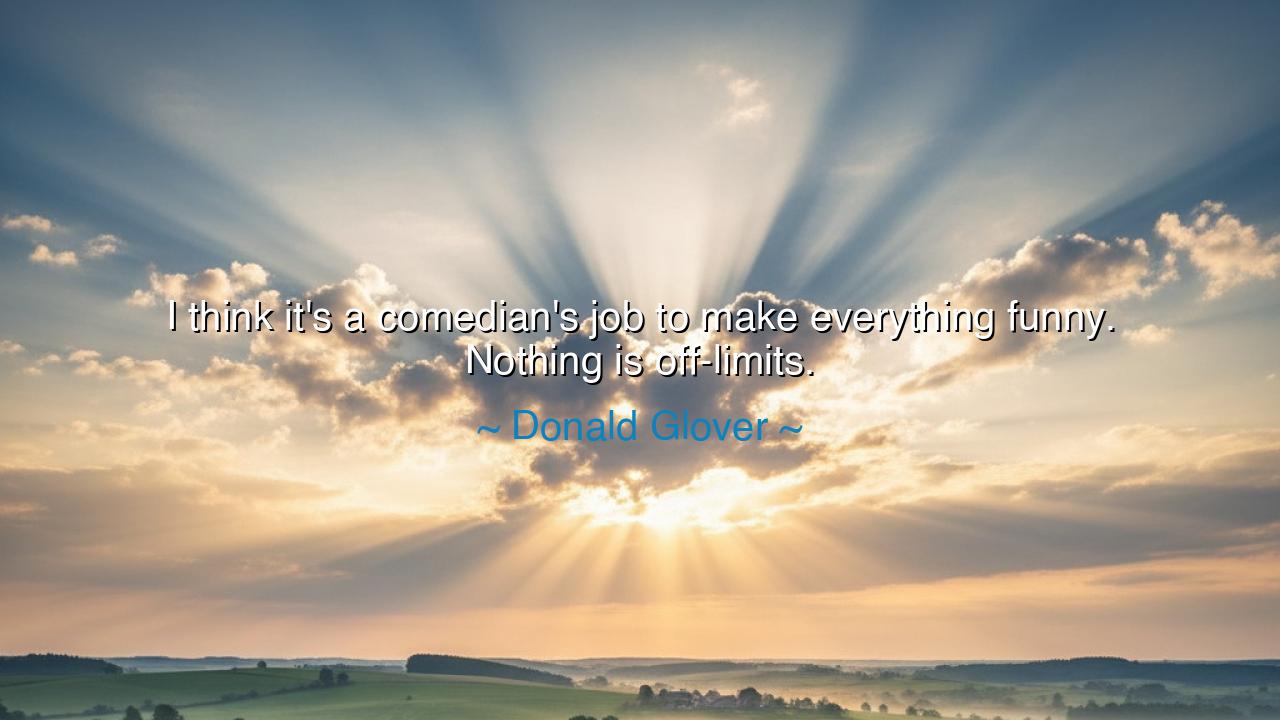
I think it's a comedian's job to make everything funny. Nothing






“I think it’s a comedian’s job to make everything funny. Nothing is off-limits.” Thus spoke Donald Glover, a creator of many forms—a jester, philosopher, and prophet in equal measure. His words are not merely about laughter; they are about the duty of the artist to confront truth without fear. For in this bold declaration lies an ancient principle: that the sacred and the profane, the beautiful and the terrible, must all be faced, transformed, and understood. The comedian, like the philosopher, walks among the boundaries that others dare not cross, turning pain into insight and sorrow into song.
To say that nothing is off-limits is not a license for cruelty, but a call to courage. In every age, there have been those who wield humor as a blade to cut through hypocrisy and fear. The ancients had their satirists, the Romans their jesters, the Greeks their playwrights, who dared to mock the gods and kings alike. Aristophanes, in his comedies, laughed at war and politics while Athens itself trembled. He knew that laughter could expose falsehood more sharply than any speech. And so it is with Glover: his words remind us that the purpose of humor is not to offend for offense’s sake, but to reveal truth through laughter, to find light even in the darkest corners of existence.
The comedian, in the truest sense, is not a clown of frivolity but a warrior of perception. To make “everything funny” is to assert mastery over fear, to say that no subject is too sacred to be examined, no pain too great to be understood. This power—to laugh at what would otherwise destroy us—is one of the oldest and most human acts of rebellion. The slaves of Rome laughed at their masters in secret; the oppressed of every land found freedom in jokes whispered under watchful eyes. Humor is the last refuge of the free mind. It transforms despair into defiance and suffering into story.
Donald Glover himself, in his art, walks this sacred balance. Through his music, comedy, and film, he explores the raw contradictions of race, fame, violence, and love. In his world, laughter is not escape—it is confrontation. When he says “everything funny,” he means that nothing in life is beyond the reach of transformation. To laugh at tragedy is not to belittle it, but to reclaim it, to say: this pain will not define me; I will define it. Such is the power of humor when it is born from wisdom and compassion—it heals even as it provokes.
History offers us another echo of this truth in the life of Voltaire, the French philosopher whose wit shook empires. He mocked kings, priests, and tyrants, often at great personal cost. His laughter was not cruelty—it was courage disguised as mirth. He knew that the tyrant fears ridicule more than rebellion, for rebellion can be crushed, but ridicule endures. Voltaire understood, as Glover does, that laughter is a weapon of the spirit—a way to reclaim power from fear. The comedian, therefore, stands in the lineage of philosophers, poets, and prophets, whose laughter holds a mirror to humanity itself.
Yet, there is danger in this calling. To make “everything funny” requires discernment and heart. The line between liberation and cruelty is thin. The true comedian, as Glover implies, does not laugh to wound, but to awaken. To confront what others fear with humor is not mockery—it is mercy. It is a way of saying: look, even this darkness can be faced; even this sorrow can be endured. It is the alchemy of the soul that turns pain into laughter, fear into understanding, and chaos into creation.
So, dear listener, take this wisdom as your own: nothing in life is off-limits to meaning, and humor is one of the oldest paths to that meaning. When life wounds you, laugh—not out of denial, but out of defiance. When the world trembles under the weight of its own seriousness, be the voice that dares to see the absurd and the divine side by side. For as Donald Glover reminds us, the comedian’s duty is the human duty—to face truth in all its forms, to find light where others see only shadow, and to speak boldly where silence has ruled.
Thus, let your laughter be not empty noise, but holy rebellion. Let it remind you that even in darkness, the soul can still dance. And when the world says, “This cannot be joked about,” remember that to laugh is to live—and that the greatest strength of all is the ability to look at everything, even pain, and still find something funny in it.






AAdministratorAdministrator
Welcome, honored guests. Please leave a comment, we will respond soon